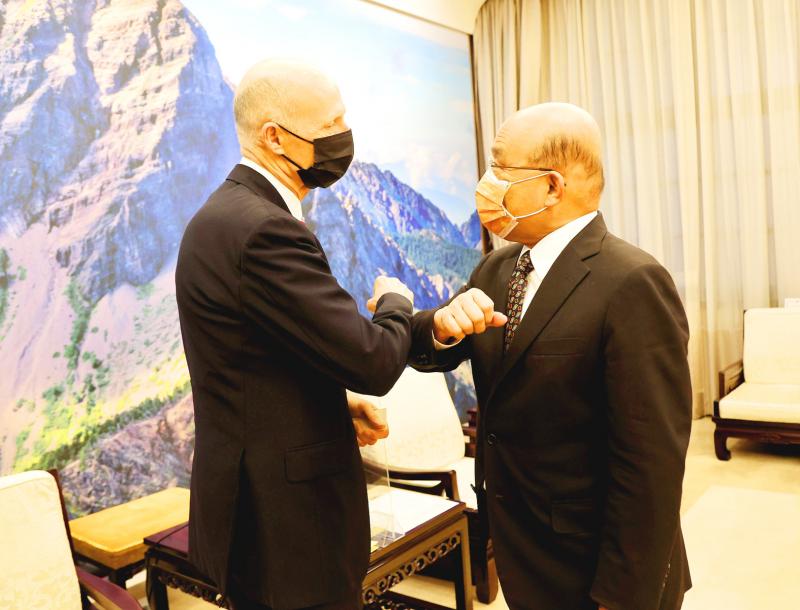The Ministry of Health and Welfare’s long-term healthcare 2.0 project has grown to serve nearly four times the number of people it handled when it started five years ago, it told the Cabinet yesterday.
The program is serving 470,000 people, or 3.8 times more than in 2017, while its coverage has surged by more than 300 percent to cover 67.03 percent of the nation and its budget has increased to NT$60.7 billion (US$2 billion) since 2016, it said.
A Taiwan Marketing Research poll, commissioned by the ministry, showed that more than 90 percent of respondents over three consecutive years said they were satisfied with the program and how it alleviated stress for people caring for those with long-term illnesses.

Photo: CNA
The program received a 97.6 percent satisfaction rating last year, demonstrating that the public supports the initiative, the ministry said.
Since its inception, the program’s main goal has been to establish at-home, communal or stay-over healthcare for people who require long-term care, establish payment schemes for workers, guarantee wages for long-term healthcare workers, increase service coverage, and develop measures to prevent or slow the loss of cognitive abilities among older people.
The program provides care through three types of centers: Category A is comprised of communal integrative service centers, category B are composite service centers and category C consists of front-end care centers.
Premier Su Tseng-chang (蘇貞昌) said that the number of service locations across all three categories exceeded 11,000 nationwide, while the “one day care center per school area” project has also grown to 760 centers, with the two combining for a total national coverage rate of 65 percent.
Su has instructed the ministry to continue to improve the initiative and said he would ask agencies such as the Ministry of Labor, the Ministry of Education, the Ministry of Finance, the Ministry of Economic Affairs and the Financial Supervisory Commission to help with the program.
The health ministry said it wants the program to change the public’s perception of long-term healthcare, moving from all-day and one-on-one service models to daycare centers where a few workers can aid many people, or to a small-scale multifunctional family care service model.
The ministry is encouraging people to interact more with professional care workers and help “train” people to take more responsibility in caring for themselves to reduce their need for full-time care.

‘DENIAL DEFENSE’: The US would increase its military presence with uncrewed ships, and submarines, while boosting defense in the Indo-Pacific, a Pete Hegseth memo said The US is reorienting its military strategy to focus primarily on deterring a potential Chinese invasion of Taiwan, a memo signed by US Secretary of Defense Pete Hegseth showed. The memo also called on Taiwan to increase its defense spending. The document, known as the “Interim National Defense Strategic Guidance,” was distributed this month and detailed the national defense plans of US President Donald Trump’s administration, an article in the Washington Post said on Saturday. It outlines how the US can prepare for a potential war with China and defend itself from threats in the “near abroad,” including Greenland and the Panama

A magnitude 4.9 earthquake struck off Tainan at 11:47am today, the Central Weather Administration (CWA) said. The hypocenter was 32.3km northeast of Tainan City Hall at a depth of 7.3km, CWA data showed. The intensity of the quake, which gauges the actual effect of a seismic event, measured 4 in Tainan and Chiayi County on Taiwan's seven-tier intensity scale, the data showed. The quake had an intensity of 3 in Chiayi City and County, and Yunlin County, while it was measured as 2 in Kaohsiung, Nantou County, Changhua County, Taitung County and offshore Penghu County, the data showed. There were no immediate reports of

The Chinese Nationalist Party (KMT) is maintaining close ties with Beijing, the Democratic Progressive Party (DPP) said yesterday, hours after a new round of Chinese military drills in the Taiwan Strait began. Political parties in a democracy have a responsibility to be loyal to the nation and defend its sovereignty, DPP spokesman Justin Wu (吳崢) told a news conference in Taipei. His comments came hours after Beijing announced via Chinese state media that the Chinese People’s Liberation Army’s Eastern Theater Command was holding large-scale drills simulating a multi-pronged attack on Taiwan. Contrary to the KMT’s claims that it is staunchly anti-communist, KMT Deputy

RESPONSE: The government would investigate incidents of Taiwanese entertainers in China promoting CCP propaganda online in contravention of the law, the source said Taiwanese entertainers living in China who are found to have contravened cross-strait regulations or collaborated with the Chinese Communist Party (CCP) could be subject to fines, a source said on Sunday. Several Taiwanese entertainers have posted on the social media platform Sina Weibo saying that Taiwan “must be returned” to China, and sharing news articles from Chinese state media. In response, the Mainland Affairs Council (MAC) has asked the Ministry of Culture to investigate whether the entertainers had contravened any laws, and asked for them to be questioned upon their return to Taiwan, an official familiar with the matter said. To curb repeated